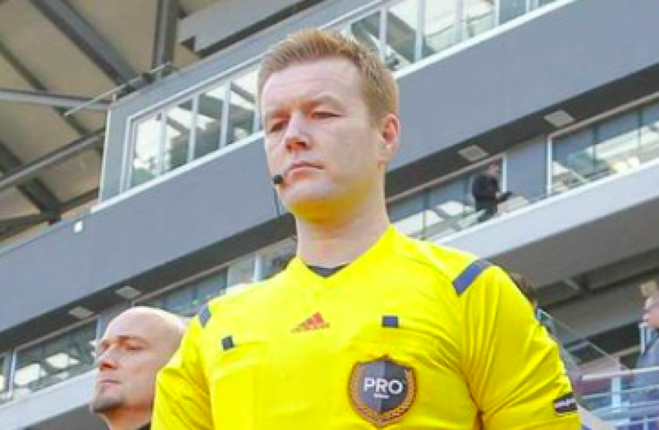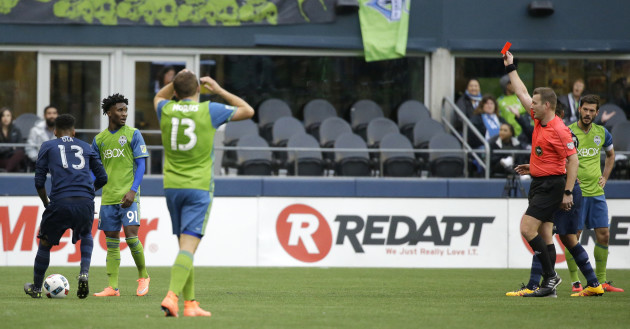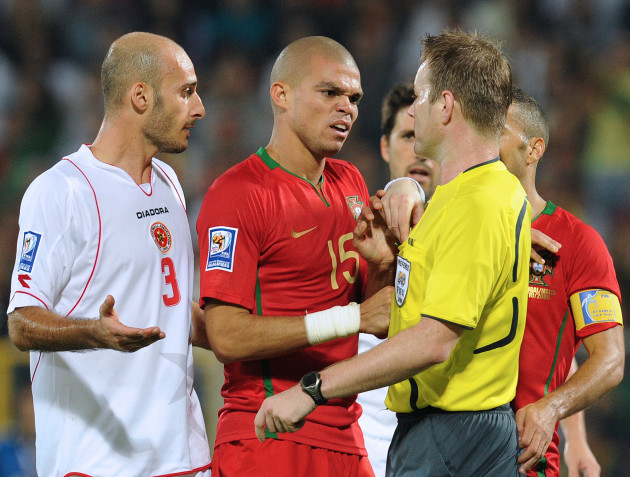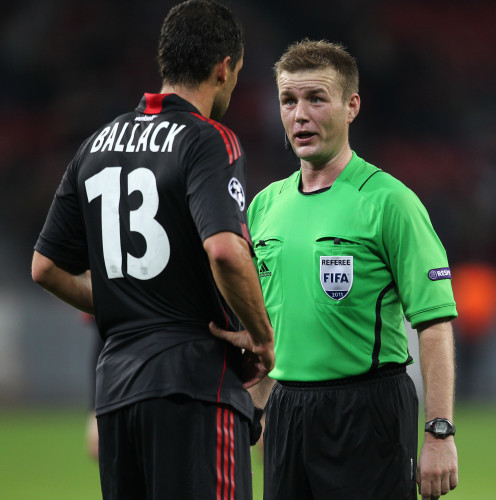IT’S A BITTER Friday morning in Toronto. Minus 10 degrees – the type of piercing cold that cuts right through you if you’re not used to it.
My cab weaves its way through early morning traffic and, along the footpaths, the steam from the subway rises through the grates along the ground. Commuters, bundled up in scarves and hats, clutch their takeout coffee cups tightly – some brief respite from Mother Nature.
As I journey toward the heart of the downtown core, I’m reminded that a neat metaphor for tonight’s MLS Cup is all around me: this is about the survival of the fittest.
Toronto hosts the championship decider at BMO Field later and the local side feature for the first time, as do their opponents – the Seattle Sounders.
But there’s someone else making an MLS Cup debut – the referee.
Alan Kelly has been on plenty of grand stages before: the Bernabeu and Bayern’s Allianz Arena for Champions League assignments as well as Schalke’s Veltins-Arena for a Europa League knockout clash. There have been numerous World Cup and European Championship qualifiers. Closer to home, there were two FAI Cup finals.
He is, by a long way, Ireland’s best-known and most high-profile referee. But, for almost three years now, he’s been based in Boston.
Headhunted by the Professional Referees Organization (PRO) – overseen by former Premier League official Peter Walton – Kelly relocated with his family in January 2014 and took charge of his first MLS game just a few months later. Inevitably, it’s been quite the success story.
In 2015, he was named as the best referee in the league. He repeated that trick this year. And, tonight, he’ll take charge of his first MLS Cup decider.
And, as he admits when we meet and sit down in a Toronto hotel, it’s been a bit different this time.
He arrived in the city on Thursday lunchtime – an unusually long build-up. Normally, he’d land the day before a game, have a nap, some dinner, then head to bed. The match-day routine takes care of itself.
But this is the biggest show in town. There are team meetings and logistics to sort. Kelly got back from a trip to Niagara Falls late on Thursday night and was greeted with a litany of emails. But there have also been a litany of messages from home – from family, friends and the extended League of Ireland community too. And that has meant a lot.
There’s also the fact that Kelly has two of his children and his father Pat (himself a former League of Ireland referee) with him here. His wife is back in Boston, taking care of their newborn daughter.
“It is a big deal”, he tells The42.
Having given up so much a few years ago, I never thought about doing this. The magnitude hasn’t really sunk in yet. Once it’s over I’ll be able to reflect on it. The two FAI Cup finals and the Champions League games are career-highs but this will rank right up there – a Cup final in another league in another continent.
But that’s not the focus now. The focus is about getting the job done. The family is here so that’s a welcome distraction as well. I don’t get nervous about games. The worst part of every game-day for me is when you finish lunch and it’s the two hours waiting around the hotel. You want to go for a sleep and relax and you kinda do and then you’re getting ready to leave the hotel – that’s the worst. Because you know it’s nearly game time and you just want to get out on the pitch at that stage”.
For many, the role of the referee is easily condensed.
But there are many nuances and many similarities between them and the players. Preparation is key. It’s not just about the physical side of things, though that’s forensically treated. Kelly, like others, will study game notes. He’ll watch both teams in action and research their style of play, their preferred formations and lineups. It will give him an idea of what to expect in terms of the game narrative. It’s those finer details that are unknown to many.
“Not many people are going to be aware of what we do behind the scenes”, Kelly says.
“There is a method to our madness. We don’t focus on individual players but something I’ve looked at this week is potential lineups and formations. It’s an unusual gig in a way because it’s a final but one team has a home field advantage. It’s a dynamic I haven’t been used to before. So, how have Toronto lined up at home? How have Seattle tended to do things away from home this season? Teams will prepare, players will prepare, coaches will prepare. And we prepare.
We’ll have a team meeting this evening and discuss game tactics but the message will be the same: ‘We’ve got a job to do. Let’s make sure it’s one decision at a time, that everybody is focused and concentrated and if there’s a big decision to be made, let’s make sure we make the right one’. You don’t want Sunday’s newspapers and the social media side of things to be focused on a refereeing decision”.
Kelly is 41 now and has regularly been rewarded for his consistent MLS displays. This is the ultimate prize: the most high-profile game in the North American domestic game. So, what are the future plans? When you’re at the top, where’s left to go?
“I love refereeing. I love being on the field. And I’d like to think that over my career, I’ve been professional enough not to leave my standards drop. So, tomorrow’s game is tomorrow’s game. Then there’s the off-season. Then there’s rest, recovery and preparation for next season and that’s the only way I look at it. I’ll approach next season the same way I approached this season. This is my job. So I can’t afford to let my standards drop. I want to be out there on a week-to-week basis. And there’s always the motivation to do that. I love what I do and take a huge amount of pride in it.
I’ll enjoy this but I’m not going to be on the field forever. I’m looking beyond my on-field career. What I’ve been exposed to here over the last three years is a huge amount of experience in terms of the professional side, the coaching and development side, the management side, the assessing, mentoring – all of that. For me, that’s always been where my future will be but the last three years has driven that home an awful lot more. And the last three years will assist me greatly in making that transition”.
The move to the US was a big one. Kelly had concerns about how his family would react to leaving the comfort and familiarity of Cork. Would they pine for home? Would the novelty of new surroundings wear off after a few months? Would it put a stress and strain on the entire unit?
“I worried about them”, Kelly admits.
“My two oldest kids were five and three when we came over but it’s been seamless for them. I worried about my wife and whether she’d settle. But again, it was effortless. Do we see ourselves in the US long-term? We could, for sure. There’s an awful lot of opportunities here.
But there’s always an attraction to home. All of our family are at home. If the opportunity arose to go home and be involved in something similar to what’s over here, it’s obviously something I’d look at. It’s an important decision because it would have to be the right one for the family. If we do move again, it would probably be the last one because we can’t keep moving the kids around”.
Family crops up, unintentionally, quite a bit throughout our chat. I ask Kelly if he’s superstitious. Something he quickly rebuffs.
“I don’t put my jersey on when I’m coming out of the tunnel or anything like that. The routine is always the same. Pregame stuff is pretty much the same. The order in which we do things is pretty much the same”.
But it’s in the routine where the superstition occurs. Regularly, Kelly allows himself a moment to look back and trace his steps and remember the people he’s shared those steps with. Before every game, that moment happens just before kick-off.
“I remember my first game as a referee. It was a 7-6 cracker. Under-11s. Back in Cork. Tramore and Mayfield. 13 goals. 12 breakaways and a dodgy offside. I’ll remember that stuff. The first underage cup final at Turner’s Cross was Leeds and Kilreen. I’ll always reflect on where I’ve been, in terms of how we started, how we progressed, the highs, the lows and everything in between.
I think about it from time to time. When we’re in the lineup and the anthems are playing, I always focus on one point in the stand that we face. I’m not looking for anyone there but you envisage them: wife, kids, parents, grandparents. It’s something to take your mind off things for 15 or 20 seconds”.
There’s an odd dysfunction to the life of a referee and Kelly agrees.
Much like goalkeepers, officials are only ever remembered for their errors, however infrequent they are. Nobody references the good, only the bad. Like goalkeepers, officials often spoil the very reason we watch games: to see goals. Like goalkeepers, they’re an easy target for abuse and vitriol. There’s a weirdness to wanting that, right? There must be.
“There’s an element of madness to it”, he says.
You’ve got to be mad to be a goalkeeper? There’s an element of needing to be a little bit crazy to do what we do. But at the same time, I wouldn’t change it. I’m a firm believer in that you’re either born to do this job or you’re not. For as along as I can remember, it’s what I’ve wanted to do. There have been many times when I’ve thought to myself, ‘Really? Why? Why do I put myself through this?’ But that’s just part and parcel of football. Human error has always been a part of the game and not just from a refereeing point of view.
We endeavour to get decisions correct – especially the big ones. It doesn’t always happen. It could be because of the angle we had or the interpretation of the incident itself. There will always be debate about the decisions we make. We see it, we give it. If you start overplaying things too much, thinking about it too hard, it starts messing with your head and that’s what you don’t want.”
Kelly can also rely on those around him. Last summer, I watched Kelly up close and spent an evening with him as he took charge of a local derby between Toronto and Montreal.
In the referees’ room, there was constant dialogue between him and his officiating team before, during and after the game. Kelly played the role of captain, taking charge and delivering the pep talks. But, the majority of what he had to say revolved around the importance of communication between him, his linesmen and the fourth official. The message was clear: we’re all in the trenches together.
“There is a team of four there”, Kelly says.
“It would be foolish to go out and referee as an individual when you have three other pairs of eyes there to assist. There is that team ethic. Communication is key – what to say, when to say it”.
One thing that strikes you when watching Kelly in action is how he’ll converse with players during games. He’ll encourage them, something that just comes naturally. When he sees a good pass, he’ll say it. Sometimes, he’ll listen to their claims and counter-claims and offer some counsel. But sometimes, he’ll instantly dismiss and chastise. It’s a delicate balancing act.
“It’s important to communicate during games”, he says.
It’s important for the players to feel comfortable with you and feel confident in your decision-making abilities. I think players appreciate that – my experience has led me to believe it. They can come and ask a question. They may get an answer, they may not. More often than not, if it’s the right time, they’ll get something. But it’s finding the right balance and never crossing over the line of over-familiarity with the players.
I always work towards being proactive rather than reactive on the field. I’d much prefer to get in a player’s ear and say ‘Hey – that last tackle was borderline. Just be careful with it. Make sure that your timing is right because if it’s not, you could be in trouble’. And I think they appreciate that. It’s always been there for me. In rugby, the referees are mic’d up so everyone can hear them. Football referees have always kind of had that communication – it’s just that people just don’t get to hear it. I’m not saying it’s the same because each individual is different but I’ve always been comfortable with talking to players and I’d always encourage it”.
As our conversation ebbs to a conclusion, there’s another reminder that this game and everything about it is a little different. Usually, the night before, Kelly will disappear from his hotel room and catch a film at a nearby cinema. It breaks the monotony.
But this time, there will be a family dinner. It’s a nice change and something to look back on. As he gets older, those things – the memories – are becoming increasingly important to Kelly.
“I took my kids to New York Red Bulls last year and the match-day poster was pretty cool with the skyline in the background. My daughter was at the game and she asked me to sign it and she framed it and put it on her bedroom wall. I haven’t been ‘that guy’ throughout my career but lately, I have been keeping mementoes. The match-day programme will be something to hold onto from this game. And our jersey. It’s got the MLS embroidery on it, I’ll get the guys to sign it afterwards and it’ll never be used again. It’s good to have memories – that’s the main thing”.




